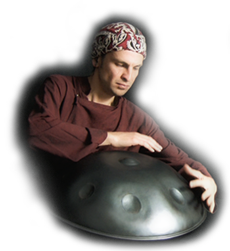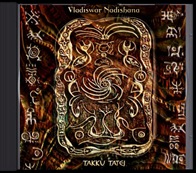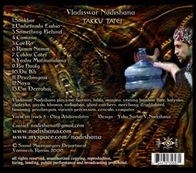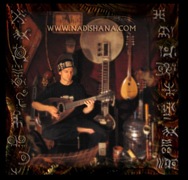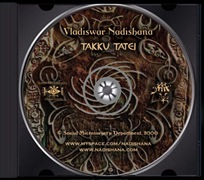Такку Та Тей
| Исполнители: | Nadishana |
| Лейбл: | Кафедра Звуковой Микрохирургии |
| Жанр: | world fusion, ethnic jazz |
| Disc: | cd |
| Дата релиза: | September 18 2000 |
|
You can also buy this album at |
|
Описание
Музыка на этом диске содержит в себе влияние таких разных музыкальных традиций, как болгарская, индийская, арабская и русская. В работе использовались разные необычные способы редактирования и обработки аудиоматeриала.
Инструменты: бансури, табла, манджира, йыоынгская бамбуковая флейта, калюка, жалейка, гайда, хомус, нидлафон, ловцы духов, морчанг, голос, дзуддахорд, баннбанг, пружингам, разная перкуссия, ценцаки, компьютер
Рецензии
author: World Music CentralOne of the most pleasant discoveries of 2006, thanks to social networking site Myspace, is Berlin-based Russian multi-instrumentalist Vladiswar Nadishana. He has released several self-produced CDs on his own label. Takku Ta Tei was recorded earlier, in 2000. On this album Vladiswar Nadishana uses dreamlike electronics and sequences combined with distant wind instruments, Asian strings, frame drums, Indian vocals and echoing sounds.
Really interesting, enjoyable and also surprising.
author: Gerald Van Waes
Vladiswar Nadishana plays on this release a whole number of instruments of which many I've never heard, and some not under their original names. He plays bansuri, or Indian flute, tabla, manjira, or Indian hand cymbals, "yeioing" bamboo flute, a self built flute in semitone scale, kalyaka, or Russian overtone flute, zhaleka, or Russian reedpipe, gayda, or Yugoslavian/Thracian bagpipe, khomus, or Ancient Jew's harp, nidlaphon, a self built instrument consisting of a needle and pen used to drum the cymbal, wind and stringed ghost catchers, or some self-built overtone instrument, morchang, or Indian jew's harp (see here), dzuddahord, or a self built kind of sitar-guitar (see here), bananng, or preparated beer- and coffee-tins, pruzhingum, or a self-built prepared gamelan-like instrument, and many more percussion instruments, cencaki, or "junkphones", musical instruments made from junk, computer, and I also heard a few vocal samples. Some sounds of instruments I cannot recall, like the strange pipe-like sound as if sampled to play with keys or programming with a computer as some arrangement on "Umbetombi Embio". Vladiswar shows a very specific flute style which might be influenced by Slavic traditions (they have lots of different flutes in their traditions, fitting with the wide landscapes and huge forests and mountains), but just a few times the flute playing leans to Irish themes, even when the context is different. And he also is a talented colourist on percussion. The music on this CD is said to contain influences of Bulgarian, Indian, Arabian, Kuzhebarian and Russian musical traditions. I heard for instance a mixture of Middle Eastern with jazz and other ethnofolk on "Something behind" with rather progressive touches. In general one can say that Vladiswar's music has much of an all-world attitude and he succeeds to make even a modern blend, gaining even more identity through his approach, inspired through the creative core from several traditions. Really interesting, enjoyable and also surprising...


